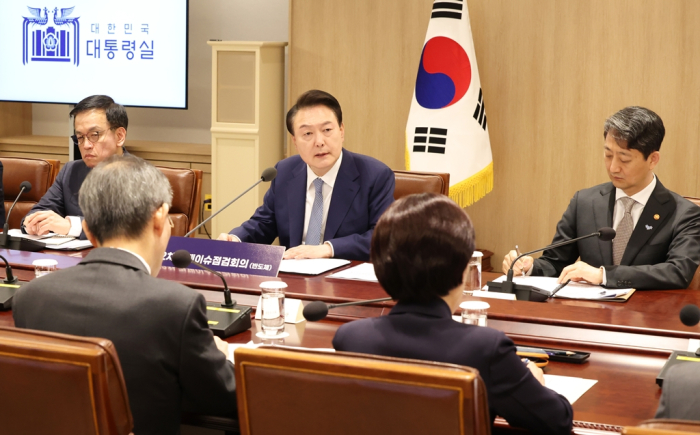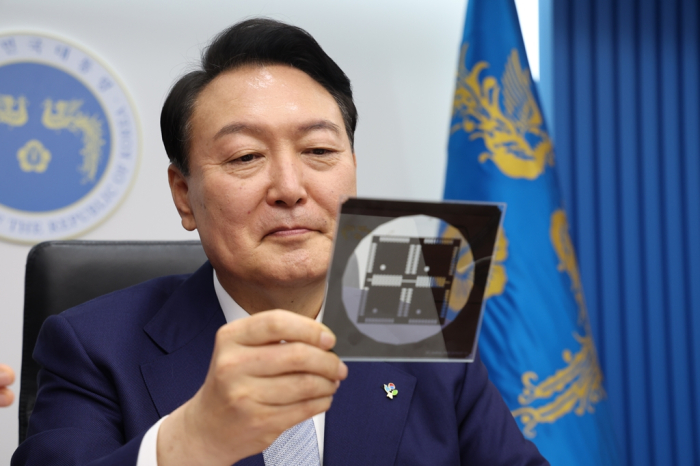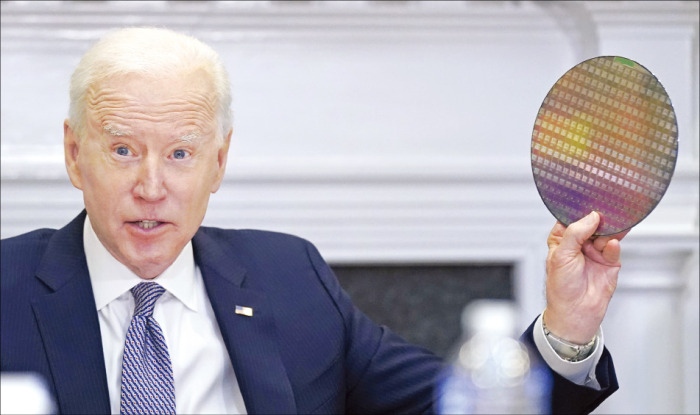Business & Politics
South Korea pledges $19 billion support package to revitalize chip sector
The latest government package is much larger than the 10 trillion won plan announced earlier this month
By May 23, 2024 (Gmt+09:00)
3
Min read
Most Read
LG Chem to sell water filter business to Glenwood PE for $692 million


Kyobo Life poised to buy Japan’s SBI Group-owned savings bank


KT&G eyes overseas M&A after rejecting activist fund's offer


StockX in merger talks with Naver’s online reseller Kream


Mirae Asset to be named Korea Post’s core real estate fund operator



South Korea, home to the world’s two largest memory chipmakers Samsung Electronics Co. and SK Hynix Inc., has unveiled a record 26 trillion won ($19 billion) state support program for the country’s semiconductor industry.
The support package, which includes financial aid, a new chip fund and extended tax breaks, is expected to be a tailwind for Korea’s big and small chipmakers, fabless chip design houses and foundry players, the Presidential Office said on Thursday.
The multibillion-dollar support program exceeds plans suggested by Finance Minister Choi Sang-mok earlier this month when he said the government targeted more than 10 trillion won in support for chip investments and research.
Under the latest plan, announced at an economy-related ministers’ meeting presided over by President Yoon Suk Yeol earlier on Thursday, the government is set to provide 17 trillion won in financial aid through the state-run Korea Development Bank to support chipmakers’ large-scale facility construction.

President Yoon also promised to extend tax benefits for chip investments due to expire at the end of this year to boost employment and attract more talent to the industry.
Korea is currently building a “mega chip cluster” in Yongin, south of Seoul, touted as the world's largest high-tech chipmaking complex.
The industry-led $261 billion chip cluster is being pushed by Samsung, SK Hynix and other local companies.
Yoon said the government will also launch a “1 trillion won chip industry ecosystem fund” to support fabless chip design firms and equipment makers.
Government officials pledged to roll out the necessary infrastructure as quickly as possible.
TO BOLSTER SYSTEM CHIPS, FABLESS FIRMS
The president called on Trade, Industry and Energy Minister Ahn Duk-geun to come up with measures to support Korea’s system chip and foundry companies to help them close the gap with global leaders.

“The success of the chip industry depends on system semiconductors. Korea’s fabless firms’ global market share is insignificant. The gap between our foundry players and global leaders is too wide,” he said.
A system chip or a system on a chip (SoC) is an integrated circuit that integrates several components such as the central processing unit (CPU), the graphics processing unit (GPU) and memory interfaces on a single substrate or microchip.
System chips, also known as logic chips, account for two-thirds of global semiconductor revenue. The US is the world’s top system chipmaking country controlling 70% of the market. Japan holds a 5.6% market share. Korea’s market share stands at a mere 3%.
Korea’s fabless firms account for just 1% of the global market. LX Semicon Co. is the only one among the world’s top 50 fabless companies.
Although Samsung is the world’s largest maker of memory chips, including DRAM and NAND, it is a distant runner-up in the foundry or contract chipmaking business to dominant player Taiwan Semiconductor Manufacturing Co. (TSMC).

SMEs TO RECEIVE 70% OF AID PACKAGE
Yoon said the support package is designed to benefit the entire domestic semiconductor supply chain, with a particular focus on smaller companies.
“If chipmakers expand their investment and make more profits through the tax support, they will create more jobs, revitalize the economy and increase the country’s tax revenue, which is good for the whole,” the president said.
More than 70% of the state package will go to small- and medium-sized companies, he said.
Korea has promoted semiconductors as the backbone of its economy – Asia’s fourth largest – but has often come under fire for its slowness in providing infrastructure and building a skilled workforce.
Korea is caught between the US and China, in particular, in an escalating fight over semiconductor supremacy.
In an intensifying bilateral conflict, the US, a key Korean ally, has imposed sanctions on advanced chip technology exports to China, Korea’s biggest trade partner.
Semiconductors account for a fifth of Korea’s exports.
Write to Byung-Uk Do at dodo@hankyung.com
In-Soo Nam edited this article.
More to Read
-
 Business & PoliticsSouth Korea eyes $261 billion chip cluster; Samsung takes lead
Business & PoliticsSouth Korea eyes $261 billion chip cluster; Samsung takes leadMar 15, 2023 (Gmt+09:00)
4 Min read -
 Korean chipmakersUS CHIPS Act threatens Samsung, SK Hynix’s memory supremacy
Korean chipmakersUS CHIPS Act threatens Samsung, SK Hynix’s memory supremacyMar 02, 2023 (Gmt+09:00)
4 Min read -
 Business & PoliticsKorea proposes bigger tax breaks for chipmakers, key industries
Business & PoliticsKorea proposes bigger tax breaks for chipmakers, key industriesJan 03, 2023 (Gmt+09:00)
2 Min read -
 The KED ViewNo holds barred: State support for Samsung, SK Hynix, Hyundai Motor
The KED ViewNo holds barred: State support for Samsung, SK Hynix, Hyundai MotorJan 03, 2023 (Gmt+09:00)
4 Min read -
 Korean chipmakersKorea may be backpedaling in semiconductor push: Lawmaker
Korean chipmakersKorea may be backpedaling in semiconductor push: LawmakerMay 20, 2022 (Gmt+09:00)
4 Min read
Comment 0
LOG IN


